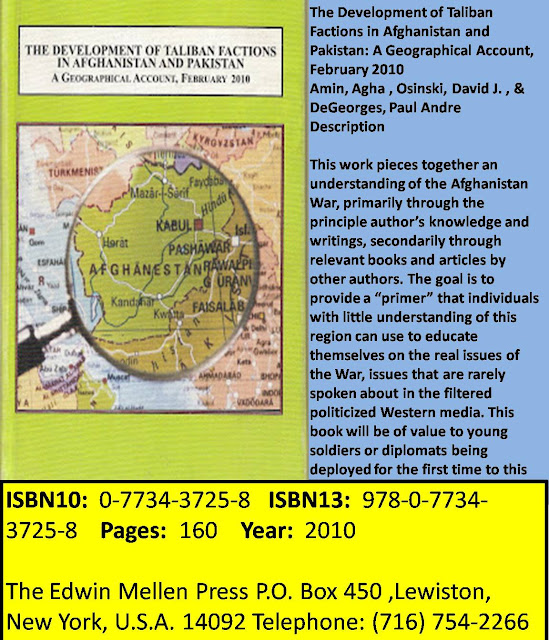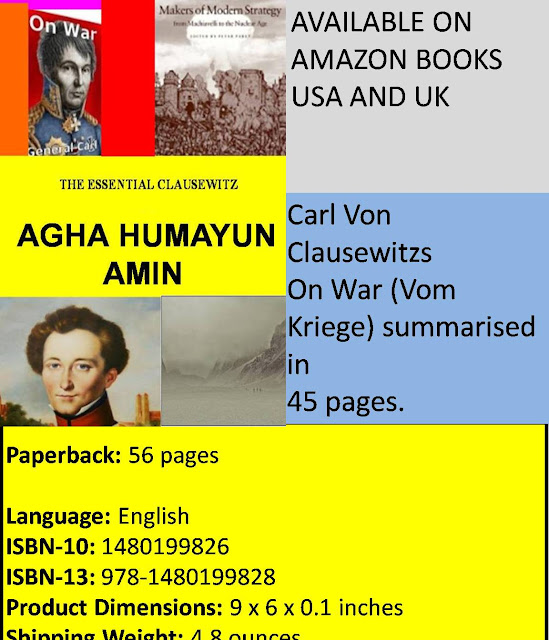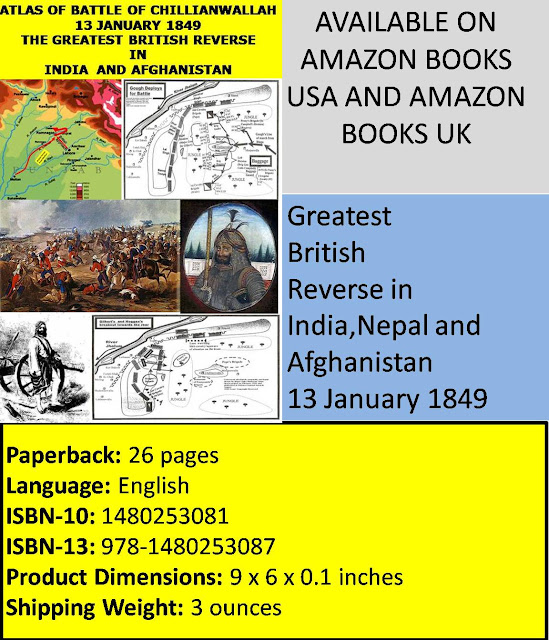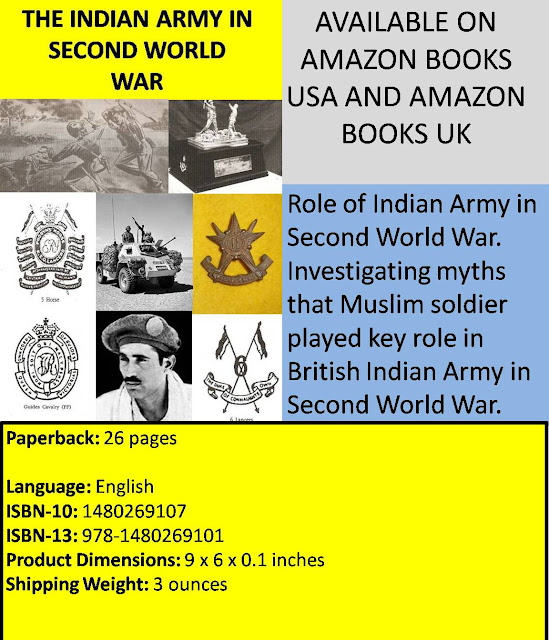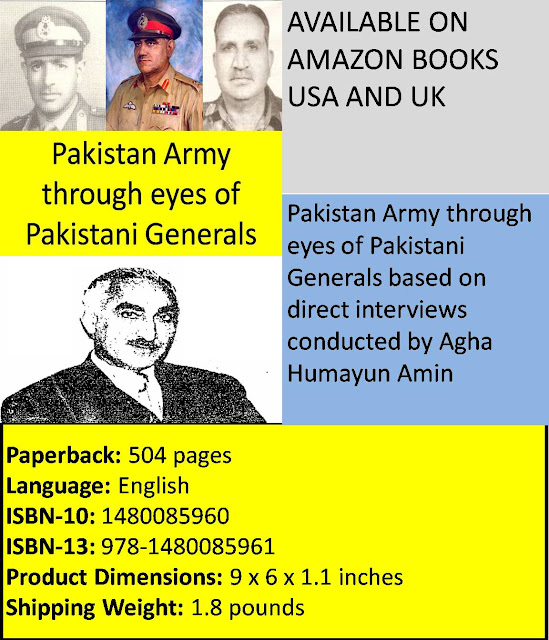Battle of Sulaimanke-Fazilka-1971-TODAY IGNORANT FOOLS ONLY REMEMBER IT FOR MAJOR SHABBIR SHARIFS NISHAN I HAIDAR
Agha H Amin
Agha H Amin
Brigadier Ameer Hamza was my fathers platoon commander at PMA.
A witty man he on being asked as to why 6 FF was deployed by him on far bank of a canal stated that as most men were Pashtuns and non swimmers,they could not run away as they were non swimmers.
Gen Hamzas friend and Gen Hamzas son Captain Abid Hamza ,when I met him in 1989 recounted an incident where the famous Major Rasheed Warraich had literally thrashed a paper tiger brigade major of Gen Hamz known as Major Abdul Waheed Kakar.
Gen Hamza in my 1989 meeting had fondly recalled Maj Altaf Janjua , 7 Punjab , his son in law and famous analysts Mahnoor Sultans father.
Great battle and led by a great commander Brigadier Ameer Hamza ! Sad that he was not promoted as he did not belong to the area between Indus and Chenab Rivers , despite getting an SJ twice and an HJ.
I remembered those 1979 shoots of Neel gai at Sulaimanke.
Major Shabbir Sharif was an outstandingly brave man , so recalled Gen Hamza, but without an unconventional man like Hamza pushing the citations , could he have got a Nishan i Haidar ?
A rare case where a deserving man got the NH.
My friend and class fellow from Forman Christian College, Atique son of Brig Khaleel , son in aw of Dr Zakir Hussain, my grandfathers class fellow and Indias president , the famous squash player proudly told me in FC College that his brother was married to Major Shabbir Sharifs wife.
A close family relatives wife recalled Major Shabbir Sharif as platoon commander in the PMA when he was a close friend of her husband Major Ayaz Amir.
Sharifs father who walked with my father in Lahores polo ground told him that he would have been happier if his son had lived , not withstanding the Nishan i Haidar.


with Abid Hamza dear friend in HQ 3rd Armoured Brigade.I convinced him to go to 10 Punjab his fathers unit from infantry and he did so , but 10 Punjab of 1990 which had all short service commission officers mistreated him and he resigned to join the PIA as pilot.
Pakistan's 105 Brigade commanded by Brigadier General Ameer Hamza , HJ,SJ A Qaisarani Rind Baloch from DG Khan carried out a small scale but highly aggressive operation in Sulaimanke area opposite Indian town of Fazilka.
The strength here was in Indian favour but Indian brigade commander S.S Chowdry was highly incompetent in placing his forward battalion 10 kilometre ahead of his other two battalions.
This enabled Pakistan's 105 Brigade to capture the Bund ahead of Sabuna Distributary thus ensuring the safety of Pakistan's most crucial Sulaimanke Canal Headworks which was just 1,500 metres from the border.
105 Brigade's determined counter attack severely depressed Indian Higher Commanders and 11 Corps Commander expressed a desire to abandon the area and withdraw to Fazilka Fortress and to replace 67 Brigade which was defending the area.22
Such was the state of Indian demoralisation that Western Command Army Commander finally sacked 67 Brigade Commander on 11th December.
S.S Chowdhry was replaced by Brigadier Piara Singh. At this stage the Indian brigade commander was so demoralised that he overestimated the Pakistani strength opposite him to be two infantry brigades supported by an armoured regiment 24 while in reality the Pakistani strength on east bank of Sabuna was only an infantry battalion (6 FF) supported by a depleted tank squadron of WW Two vintage tanks.
The Indians suffered heavy casualties at Sulaimanke.Some 190 Killed, 196 Missing most of whom were killed or prisoners and 425 wounded.
These casualties were far heavier than those suffered by 54 Division which fought battles like those around Bara Pind Jarpal which suffered a total of some 76 Killed and 272 wounded.
The above facts are based on books written by a person no less than Indian Western Commander in 1971 War , General Cadeth and most respectable Indian military historian Major K.C Praval .
See Candeths book and Pravals books:---
Indian Army since Independence ,Page-147 & 148-Ibid and Pages-392 & 393-Major K.C Praval
The Western Front by Lieutenant General Candeth Page-110 and 151
Typical with Pakistan Army promotion formula that "WAR PERFORMANCE HAS NOTHING TO DO WITH PERFORMANCE" while characters like Zia,Akhtar Abdul Rehman,Sawar Khan ,Iqbal,Rahimuddin who had near zero war records were promoted ! Even Abdul Ali Malik who was distinguished as per Major General Fazal Muqeem Khan for launched ill planned , bloody counter attacks in 1971 was promoted!
--
A.H Amin
Attack on Pakistan Army General Headquarters -October 2009
http://www.chowk.com/Views/GHQ-Attack-Serious-Questions
GHQ Attack-Serious Questions
by Agha Amin October 13, 2009 10:19The enemy is not in Waziristan or Afghanistan. The enemy is our own damn inefficiency and complacency. It merits serious thinking at all plains , tactical,operational and strategic.
GHQ Attack-Serious Questions
The attack on Pakistani GHQ raises more serious questions about Pakistan Army's military effectiveness and potency than answers.
The most crucial and grave question is that the Pakistani military seems to have lost in a great degree its coercive value amd moral deterrence. Something which is the foundation of any political system and on which all agree starting from Freud, Aristotle, Plato down to Marx Lenin Mao and Khomeni.
Once General Musharraf decided to make a U turn under coercion by USA the army lost its moral credibility in the eyes of a large section of Pakistani populace, not the majority but a sizeable minority far more effective in tangible potency than a far larger minority.
The first most serious question is not from where the threat originated but how did a small minority of a few handpicked young men developed the resolution to attack the citadel of Pakistani military,the GHQ ? Its an intangible question but far more serious than whether these men had their organisational centre in Wazirstan or Afghanistan.
The second serious question is the response to the attack. Or one may say the lack of response!
If ten or so armed men can terrorise and paralyse a half a million plus armys headquarter for 22 plus hours the issue is strategic rather than tactical! If ten civilians trained by irrational mullahs can penetrate a citadel hitherto considered impregnable and unpenetrable and 1600 officers inside it are like chicken in a babr wired coup at mercy of ten armed and highly motivated men then the situation is grave,not routine.
In a nutshell the serious aspects of the issue are :--
The most serious threat to Pakistan is internal and not external.
The military has lost its strategic and coercive deterrent value.
That ten armed civilians penetrated a military headquarters guarded by an infantry battalion and a similar number of DSG soldiers is a serious strategic imbalance.
That 6 plus armed men were roaming the GHQ for many hours and had the opportunity to kill many generals,an opportunity that they for some mysterious reasons chose not to exercise is a cause of grave strategic concern.
The fact that the perimeter guarding battalion 10 Punjab although it killed some four intruders failed to hold the few attackers from penetrating the GHQ is a grave matter.
The fact that the battalion plus DSG soldiers although armed with G 3 and SMG rifles just bolted away is a grave matter.
The fact that it took more than 18 hours and the fact that SSG troops had to be brought from some 70 miles away to redeem the situation is ironic par excellence.
The fact that Pakistan's enemies both state and non state are so ineffective still is the only consoling part of the issue.
Here is a case of a military machine :--
Fighting a civil war with serious internal fractures.
A military machine which has lost a great degree of its coercive value.
Lack of initiative in the officer rank and lack of forethought in not allowing the some 1600 officers in GHQ not to carry weapons.
The primacy of non state actors in Pakistan.
Sad is the story. Hilarious are the praises being heaped on the military's response. Where is the honour and dignity of danger in overcoming six well motivated irregulars by a commando force outnumbering them by 100 to 1. This is not a criticism. I am not a paid journalist. This is a call for reflection. Serious reflection and serious inner thinking that may be the spur to serious reorganisation in the Pakistani military. The enemy is not in Waziristan or Afghanistan. The enemy is our own damn inefficiency and complacency. It merits serious thinking at all plains, tactical,operational and strategic.
Read 20867 times
Published in Views
16 November, 2012
Assessment of Officers and Military Training-Pakistan Army
Assessment of Officers and Military Training-Pakistan Army
What was wrong with Assessment of Officers and Military Training-Pakistan Army and What continues to be wrong till to date as research indicates
Click on scanned pages pictures to enlarge
War Performance had nothing to do with promotion to higher ranks in Pakistan ArmyClick on scanned pages pictures to enlarge
Major Agha H Amin (Retired)
![]()
Complete article for page above on --
http://www.scribd.com/doc/27384291/Intangible-Forces-Behind-a-Military-Manoeuvre-an-Examination-of-the-Clausewitzian-Model-of-Military-Leadership
Also see the military interviews conducted by this scribe with senior Pakistani officers to see role of sycophancy and unrealistic training and assessment in Pakistan Army specially interviews of Major Gen Tajammul and Brig Z.A Khan
http://www.scribd.com/doc/23150027/Pakistan-Army-through-eyes-of-Pakistani-Generals
Selection and Assessment of Commanders in Pakistan Army-Pakistan Army Journal-Citadel-Command and Staff College
These articles published in military journals of Pakistan Army endeavour to subject the highly defective system of assessment of officers to criticism despite strict censorship.
One must add that some discussion became possible in the army only after 1988 when General M.A Baig took over .
In the Zia era , with intellectual honesty buried and hypocrisy and sycophancy being hallmark of the army for 12 long years (1976-88) this was impossible.
After 1998 once Brigadier Riaz took over as DG ISPR the situation improved.
Three editors of Pakistan Army Journal were outstanding , all in succession , i.e Colonel I.D Hassan (a chronic bachelor and very cereberal and well read) , Lieutenant Colonel Syed Ishfaq Naqvi (outstanding) and Lieutenant Colonel Syed Jawaid Ahmad (soft spoken but bold as far as publishing articles and extremely knowledgeable).
In the command and staff college there was Lieutenant Colonel Ashraf Saleem (later lieutenant general) , Lieutenant Colonel Tariq Khan (now lieutenant general) and Lieutenant Colonel Ahsan Mahmood (now major general) , all three were well read and had a high intellectual calibre particularly Tariq Khan.
After these three the pedants came and pedants and the conformists off course are in preponderance !
I would say the assessments that I made in faulty and fallacious assessment of military commanders continue !
If Tariq Khan ما شاء الله became a three star it was a triumph of destiny over a thoroughly rotten system !
But then we must remember that Moses survived in Pharohs palace and finally overcame the Pharoah !
This unfortunate country Pakistan needs a Moses , a man who purges this rotten country !
If not , then I dont have the least doubt that Pakistan will be destroyed ! It will cease to exist as a country ! This is my conviction !
This country Pakistan has no soft solutions !
WHEN ORDERS SHOULD BE OBEYED AND WHEN DISOBEYED OR MODIFIED AS SEEN IN MILITARY HISTORY-MARCH 1991
http://www.scribd.com/doc/27648037/Orders-and-Obedience
![]()
http://www.scribd.com/doc/40295974/Resolution-Cardinal-Command-Virtue
http://www.scribd.com/doc/40295974/Resolution-Cardinal-Command-Virtue
http://www.scribd.com/doc/40295974/Resolution-Cardinal-Command-Virtue
http://www.scribd.com/doc/27384291/Intangible-Forces-Behind-a-Military-Manoeuvre-an-Examination-of-the-Clausewitzian-Model-of-Military-Leadership
http://www.scribd.com/doc/27384291/Intangible-Forces-Behind-a-Military-Manoeuvre-an-Examination-of-the-Clausewitzian-Model-of-Military-Leadership
![]()
http://www.scribd.com/doc/27386132/Plain-as-Well-as-Subtle-Aspects-of-Military-Decision-Making
http://www.scribd.com/doc/27386132/Plain-as-Well-as-Subtle-Aspects-of-Military-Decision-Making
![]()
http://www.scribd.com/doc/27386132/Plain-as-Well-as-Subtle-Aspects-of-Military-Decision-Making
http://www.scribd.com/doc/27386132/Plain-as-Well-as-Subtle-Aspects-of-Military-Decision-Making
![]()
http://www.scribd.com/doc/22460733/The-Armoured-Thrust-Article-Based-on-Experiences-as-an-Umpire-with-a-tank-regiment-in-December-1993
http://www.scribd.com/doc/22460733/The-Armoured-Thrust-Article-Based-on-Experiences-as-an-Umpire-with-a-tank-regiment-in-December-1993
THE ABOVE ARTICLES MAY BE DOWNLOADED IN COMPLETE FROM FOLLOWING LINKS:---
http://www.scribd.com/doc/27648037/Orders-and-Obedience
http://www.scribd.com/doc/40295974/Resolution-Cardinal-Command-Virtue
http://www.scribd.com/doc/27384291/Intangible-Forces-Behind-a-Military-Manoeuvre-an-Examination-of-the-Clausewitzian-Model-of-Military-Leadership
http://www.scribd.com/doc/27386132/Plain-as-Well-as-Subtle-Aspects-of-Military-Decision-Making
http://www.scribd.com/doc/40295974/Resolution-Cardinal-Command-Virtue
Historical Proof of the argument presented above

Complete article for page above on --
http://www.scribd.com/doc/27384291/Intangible-Forces-Behind-a-Military-Manoeuvre-an-Examination-of-the-Clausewitzian-Model-of-Military-Leadership
Also see the military interviews conducted by this scribe with senior Pakistani officers to see role of sycophancy and unrealistic training and assessment in Pakistan Army specially interviews of Major Gen Tajammul and Brig Z.A Khan
http://www.scribd.com/doc/23150027/Pakistan-Army-through-eyes-of-Pakistani-Generals
Selection and Assessment of Commanders in Pakistan Army-Pakistan Army Journal-Citadel-Command and Staff College
These articles published in military journals of Pakistan Army endeavour to subject the highly defective system of assessment of officers to criticism despite strict censorship.
One must add that some discussion became possible in the army only after 1988 when General M.A Baig took over .
In the Zia era , with intellectual honesty buried and hypocrisy and sycophancy being hallmark of the army for 12 long years (1976-88) this was impossible.
After 1998 once Brigadier Riaz took over as DG ISPR the situation improved.
Three editors of Pakistan Army Journal were outstanding , all in succession , i.e Colonel I.D Hassan (a chronic bachelor and very cereberal and well read) , Lieutenant Colonel Syed Ishfaq Naqvi (outstanding) and Lieutenant Colonel Syed Jawaid Ahmad (soft spoken but bold as far as publishing articles and extremely knowledgeable).
In the command and staff college there was Lieutenant Colonel Ashraf Saleem (later lieutenant general) , Lieutenant Colonel Tariq Khan (now lieutenant general) and Lieutenant Colonel Ahsan Mahmood (now major general) , all three were well read and had a high intellectual calibre particularly Tariq Khan.
After these three the pedants came and pedants and the conformists off course are in preponderance !
I would say the assessments that I made in faulty and fallacious assessment of military commanders continue !
If Tariq Khan ما شاء الله became a three star it was a triumph of destiny over a thoroughly rotten system !
ما شاء الله
ما شاء الله
ما شاء الله
But then we must remember that Moses survived in Pharohs palace and finally overcame the Pharoah !
This unfortunate country Pakistan needs a Moses , a man who purges this rotten country !
If not , then I dont have the least doubt that Pakistan will be destroyed ! It will cease to exist as a country ! This is my conviction !
This country Pakistan has no soft solutions !
WHEN ORDERS SHOULD BE OBEYED AND WHEN DISOBEYED OR MODIFIED AS SEEN IN MILITARY HISTORY-MARCH 1991
On the first page a question is raised " if selection and assessment system in an army is realistic" .
There was a big question mark in 1991 when I wrote this , it remained when I retired in December 1993 because the army then was run on whims and likes and dislikes and no one bothered how good an officer was in real command and intellectual ability ! I fear that the large gaps and question marks remain to date ? The very Kargil operation proves that an overambitious man with myopic strategic vision like Musharraf can rise to the highest ranks ,shamelessly abandons bodies of soldiers and then proclaim Kargil as his greatest success ! One could see an ambitious man in him in 1993 , who was obsessed with self projection ! I had asked Lieuenant Colonel Ashraf (then CO 46 Field and my platoon commander in PMA , also GSO 1 , 14 Division what he thought of Musharraf his brother gunner officer .Ashraf an outstandingly honest and straight man hailing from Kalar Saidan near Pindi stated " what can you make of a man who uses generator of his locating unit for his house "

http://www.scribd.com/doc/40295974/Resolution-Cardinal-Command-Virtue
No one in kargil had the courage to point out that the operation was a wild gamble ! Brigadier Simon confided that that General Tauqir Zia was against it but then Tauqir Zia never gave his dissent ?
PROBLEM WITH MILITARY TRAINING , MILITARY EXERCISES AND ASSESSMENT OF OFFICERS
http://www.scribd.com/doc/40295974/Resolution-Cardinal-Command-Virtue
A real soldier in the peacteime environment of jee hazoori and yes man ship hardly has any chance of being promoted ! True in 1992 when I wrote this and true today ! Can Pakistan afford this ?
PROBABLY IN OUR SCENARIO A QUALITY TERMED AS LOYALTY , WHICH IN REALITY IS DOCILITY AND OVERCONFORMITY IS HIGHLY VALUED !AND LOYALTY OF A PERSONAL NATURE IS SHEER INTELLECTUAL DISHONESTY !
http://www.scribd.com/doc/40295974/Resolution-Cardinal-Command-Virtue
Complete article " Resolution-Cardinal Command Virtue" as published in the Pakistan Army Journal June 1992 may be downloaded from the following link---
WHY ASSESSMENT OF OFFICERS QUALITIES IS OF CARDINAL IMPORTANCE
http://www.scribd.com/doc/27384291/Intangible-Forces-Behind-a-Military-Manoeuvre-an-Examination-of-the-Clausewitzian-Model-of-Military-Leadership
http://www.scribd.com/doc/27384291/Intangible-Forces-Behind-a-Military-Manoeuvre-an-Examination-of-the-Clausewitzian-Model-of-Military-Leadership

http://www.scribd.com/doc/27386132/Plain-as-Well-as-Subtle-Aspects-of-Military-Decision-Making
http://www.scribd.com/doc/27386132/Plain-as-Well-as-Subtle-Aspects-of-Military-Decision-Making

http://www.scribd.com/doc/27386132/Plain-as-Well-as-Subtle-Aspects-of-Military-Decision-Making
http://www.scribd.com/doc/27386132/Plain-as-Well-as-Subtle-Aspects-of-Military-Decision-Making

http://www.scribd.com/doc/22460733/The-Armoured-Thrust-Article-Based-on-Experiences-as-an-Umpire-with-a-tank-regiment-in-December-1993
http://www.scribd.com/doc/22460733/The-Armoured-Thrust-Article-Based-on-Experiences-as-an-Umpire-with-a-tank-regiment-in-December-1993
For letters as sent to the staff college including the above one see the following link-
For letters as published in various military journals see the following link--
THE ABOVE ARTICLES MAY BE DOWNLOADED IN COMPLETE FROM FOLLOWING LINKS:---
http://www.scribd.com/doc/27648037/Orders-and-Obedience
http://www.scribd.com/doc/40295974/Resolution-Cardinal-Command-Virtue
http://www.scribd.com/doc/27384291/Intangible-Forces-Behind-a-Military-Manoeuvre-an-Examination-of-the-Clausewitzian-Model-of-Military-Leadership
http://www.scribd.com/doc/27386132/Plain-as-Well-as-Subtle-Aspects-of-Military-Decision-Making
http://www.scribd.com/doc/40295974/Resolution-Cardinal-Command-Virtue
Historical Proof of the argument presented above
Major Agha H Amin (Retired)
Altaf Gauhar Ayub's close confidant inadvertently proves this fact once he quite uncharitably, and for reasons, other than dispassionate objective historical considerations, described Yahya as one " selected…in preference to some other generals, because Yahya, who had come to hit the bottle hard, had no time for politics and was considered a harmless and loyal person".
Major General Abrar, who had proved himself as the finest military commander, at the divisional level, at least by sub continental standards, was sidelined and ultimately retired in the same rank!
Lieutenant Colonel Nisar of 25 Cavalry who had saved Pakistan's territorial integrity from being seriously compromised at a strategic level at Gadgor on the 8th of September 1965 was sidelined.
Lieutenant Colonel Nisar of 25 Cavalry who had saved Pakistan's territorial integrity from being seriously compromised at a strategic level at Gadgor on the 8th of September 1965 was sidelined. This may be gauged from the fact that at the time of outbreak of the 1971 War Nisar although promoted to brigadier rank, was only commanding the Armoured corps recruit training centre, a poor appointment for a man who had distinguished himself as a tank regiment commander in stopping the main Indian attack. A man whose unit's performance was described by the enemy opposing him as one "which was certainly creditable because it alone stood between the 1st Indian Armoured Division and its objective"23 was considered by the Pakistani General Headquarters pedantic officers as fit only to command a recruit training centre while one who was instrumental in failure of the main Pakistani intelligence failure as DMI was promoted to Major General rank and trusted later with the command of Pakistan's 1 Corps with disastorous results !
Brigadier Qayyum Sher who had distinguished himself as a brigade commander in 10 Division area in Lahore was also not promoted! Qayyum Sher was one of the few brigade commanders of the army who had led from the front.
Major General Shaukat Riza who rarely praised anyone had the following to say about Sher's conduct while leading the Pakistan army's most important infantry brigade counter attack on Lahore Front as a result of which the Indian 15 Division despite considerable numerical superiority was completely thrown off balance. Shaukat stated that "Brigadier Qayyum Sher, in his command jeep, moved from unit to unit and then personally led the advance, star plate and pennant visible. This was something no troops worth their salt could ignore".
But the Army's Selection Boards ignored Qayyum Sher once his turn for promotion came! Qayyum Sher did well in war and was awarded the Pakistani D.S.O i.e. the HJ!
But war performance or even performance in peacetime training manoeuvres was, and still is, no criteria for promotion in the Pakistan Army! Qayyum retired as a brigadier, remembered by those who fought under him as a brave and resolute commander, who was not given an opportunity to rise to a higher rank, which Qayyum had deserved, more than any brigadier of the Pakistan Army did.
Brigadier Nisar of 25 Cavalry who was praised by Indian historians as outstanding in delaying battle in Shakargarh as commander of changez Force was also sidelined because he was not close to Tikka Khan and company and did not possess Zias mastery of art of sycophancy and appeasement of seniors !
It was typical of Pakistan Army that Brigadier Rahimuddin who did not join his brigade in Chamb on pretext of martial law duty was promoted to general rank while Nisar who fought both the 1965 and 1971 wars exceedingly well sidelined !
In 1965 Nisar by his singular action at Gadgor had literally saved Pakistan ! But promotion in Pakistan Army had nothing to do with war performance or real soldiering ! Pathetic !
Interestingly Brigadier Irshaad heading the military intelligence in 1965 and guilty of Pakistan Armys greatest intelligence failure of 1965 i.e disregarding a genuine report that Indian Armoured division was in kashmir , dismissing it as a deception plan , was promoted to two and three star after the war .He played hell with Pakistans 1 Corps in 1971 War !
Major General Sarfaraz whose conduct as GOC was outstanding in 1965 War was not promoted because his ability was regarded as a threat by Ayub Khan !

Brigadier Tajammul Hussain Malik was praised as an outstanding commander by a person no less than the Indian opponent of his Major General lachman Singh .
A special commission was appointed by Indian Army to study Tajammuls brigade actions !
The tragedy is that all starting from Liaquat Ali Khan sidelined officers with outstanding war performance ! The first being the elevation of Ayub Khan to army chief with a proven record of tactical timidity in Burma !
Ayub Khan ,Tikka Khan and Bhutto sidelined the best officers of 1971 ! Tajammul was sidelined because he was not a pathetic sycophant with no war record like Zia ul Haq ! This is a man whose war performance was so outstanding that the Indians appointed a high level commission to study his epic brigade battle at Hilli where he literally repelled a division plus! His direct Indian opponent Major General Lachman Singh praised him as an outstanding and very brave man in his book Indian sword penetrates East Pakistan ! But the Pakistani selection boards criterion for promotion was certainly not war performance !
Major General Abdul Ali Malik noted by Major General Fazal i Muqeem for launcjing the most ill planned and failed counter attacks of 1971 War in Shakargarh Bulge was promoted to three star rank after the war !
General K.M Arif who had no war record in 1971 and no command experience beyond a brigade command for few months was promoted to two three and four star rank !
Brigadier Ameer Hamza who conducted a brilliant brigade offensive battle at Sulaimanke was similarly sidelined as a Lieutenant General whereas many others who had no war record in 1971 war as brigade commanders became corps commanders !
Major General Tajammul Hussain Malik in an interview with this scribe in September 2001 summed up these promotions in the following words:--
The peculiarity about these promotions was that except for Jahanzeb Arbab, who had been superseded earlier because of having been found guilty of embezzlement of huge amount of money while in East Pakistan by a Court of Inquiry, headed by Major General M H Ansari but continued to remain in an officiating Command of a Division with the rank of a Brigadier for nearly two years upto as late as February 1976 when he was promoted to the rank of a Major General, all others were those who were on staff in GHQ.
Major General Iqbal was doing as Chief of General Staff, Major General Sawar Khan was Adjutant General, Major General Chishti was Military Secretary and Major General Ghulam Hassan was Director General Military Training.
The Division Commanders that is to say myself, Major General Akhtar Abdur Rehman, Major General Fazal e Raziq, Major General Mateen, Major General Ch Abdur Rehman, Major General Jamal Said Mian, Major General Amir Hamza (DG Civil Armed Forces), Major General Wajahat Hussain (Commadant Staff College) were all superseded."
General Zia ul Haq had seen my conduct during the Division Commanders conferences expressing my view very candidly. He, therefore, thought that he would not be able to control me. He selected a team of 'yes men' who were more docile and prepared to accept his command without any hesitation."
Even the normal and highly defective ACR system in the army was disregarded in promotions.
Thus while Major General Tajammul had been graded as "OUTSTANDING", as a Brigadier, in his last Annual Confidential Report and again as a Division Commander was graded "Above Average" by the then Corps Commander Lieutenant General Aftab Ahmad Khan, his contemporaries Lieutenant General Faiz Ali Chisti and Late General Akhtar Abdur Rehman were adjudged on the lower side of the "Average" grade were promoted to three star rank .Chishti in 1976 and Akhtar Abdul Rahman in 1977-78.
Tajammul Hussain thus well summed up Pakistan Armys tradition of promotions when he stated:--
"In our Army, Field Marshal Ayub Khan since he became Commander-in-Chief in 1951, made sure that only those people were promoted to higher ranks, who proved their personal loyalty to him rather than loyalty to the state.
He did so because he had the ambitions of becoming the Head of State from the very beginning. As I said before, he had a contempt for the politicians and with the passage of time he went on getting extension of his tenure till he finally took over in Oct 1958.
From amongst the senior officers anyone who expressed his opinion against the Army indulging in politics was immediately retired. Some of the very capable generals who had passed out from Sandhurst were superseded when General Musa was appointed Commander-in-Chief. Now that he is dead, it is not proper for me to pass any remarks against him but I have no hesitation in saying that he was a typical Gorkha Soldier, who had learnt to obey the command of their superiors whether right or wrong. The junior officers following examples of the seniors, had also learnt that perhaps sycophancy, rather than professional capabilities, was the only criteria for attaining the higher command.
Exceptions are always there, but as a general practice many good officers who would have become very good Generals could not go beyond the rank of Lieutenant Colonel because they were intellectually and professionally far superior to their seniors and always expressed their views without any hesitation whenever and wherever required.
Commanders who attain the higher ranks through following the path of sycophancy soon crumble in the face of danger and cannot stand the test of battle fatigue. That has been an inherent weakness in our Army, which perhaps continues till today.
I had not intimately known General Zia before he became the Chief of the Army Staff but from his conduct during the Divisional Commanders Conferences, he appeared to me an incompetent and low grade officer.
In one of the Division Commanders promotion conferences, I even saw him sleeping with his mouth open.
He surpassed all limits of sycophancy when meeting the Prime Minister Zulfikar Ali Bhutto. While in uniform, he used to bow when shaking hands with Zulfikar Ali Bhutto.
I remember my old Brigade Commander, Brigadier Hayat, with whom I served as his Brigade Major, once told me that he had written in Major Zia ul Haq's ACR when he served under his command, "Not fit to go beyond the rank of a Major". It is an irony of fate that a person of such a calibre had ruled Pakistan for a long period of eleven years till he was finally killed in an air crash."
There is no second opinion possible about how Pakistan Army suffered because of military rule.Thus Major General Fazal Muqeem Khan in an officially sponsored book admitted this cardinal fact when he wrote :--
"We had been declining according to the degree of our involvement in making and unmaking of regimes. Gradually the officer corps, intensely proud of its professionalism was eroded at its apex into third class politicians and administrators. Due to the absence of a properly constituted political government, the selection and promotion of officers to the higher rank depended on one man's will. Gradually, the welfare of institutions was sacrificed to the welfare of personalities. To take the example of the army, the higher command had been slowly weakened by retiring experienced officers at a disturbingly fine rate. Between 1955 and November 1971, in about 17 years 40 Generals had been retired, of whom only four had reached their superannuating age. Similar was the case with other senior ranks. Those in the higher ranks who showed some independence of outlook were invariably removed from service. Some left in sheer disgust in this atmosphere of insecurity and lack of the right of criticism, the two most important privileges of an Armed Forces officer. The extraordinary wastage of senior officers particularly of the army denied the services, of the experience and training vital to their efficiency and welfare. Some officers were placed in positions that they did not deserve or had no training for"
The tradition continued till to date.Lieutenant General Mahmood and Usmani with all their drawbacks was far superior to Generals Aziz Yusuf and Ahsan Saleem Hayat promoted to four star rank but sidelined because feared as more resolute and thus dangerous ! It would be actually comical to match these two groups at all ! Usmani was so upright that he risked his career twice as a brigadier and major general when he took a righteous stand with his direct superiors Malik Saleem Khan in Karachi and Mumtaz Gul at Peshawar !
It is no secret that had Yusuf or Ahsan Saleem Hayat been commander 10 Corps in place of Mahmud on 12 October 1999 , Musharrafs coup would have failed ! Perhaps that was the key selection criterion for both ! Lack of resolution ! But that's what Pakistan is all about !
A Conspiracy against originality and boldness ! An undoubted failure !
Pakistan has no short of talent and military genius but our military system is a conspiracy against talent originality and boldness.Below is an article of this scribe published in Daily Nation summarising whats wrong with Pakistan Army published :---
The Development of Taliban Factions in Afghanistan and Pakistan: A Geographical Account, February 2010
Amin, Agha , Osinski, David J. , & DeGeorges, Paul Andre
Amin, Agha , Osinski, David J. , & DeGeorges, Paul Andre
BOOKS ON PAKISTAN REVIEWED-AMAZON UK
Military Leadership
Taliban war in Afghanistan
Atlas and History of Wars

THE ESSENTIAL CLAUSEWITZ
USA,ISI,AL QAEDA and TALIBAN-Setting Straight Bruce Riedels Strategic Narrative
1971 War
Mans Role in History
How a private English Company conquered a sub continent
Atlas of a great tank battle
Atlas of a bloody Indian Pakistan battle
A forgotten and Bloody British Failure
The Pakistani Tank Divisions Failure in 1965
Second World Wars Forgotten History
How Indian Army saved France and Suez Canal
Sepoy Rebellion of 1857-59 Reinterpreted
PAKISTAN ARMY THROUGH EYES OF PAKISTANI GENERALS
Posted by Agha H Amin at 8:40 PM ![]()













































